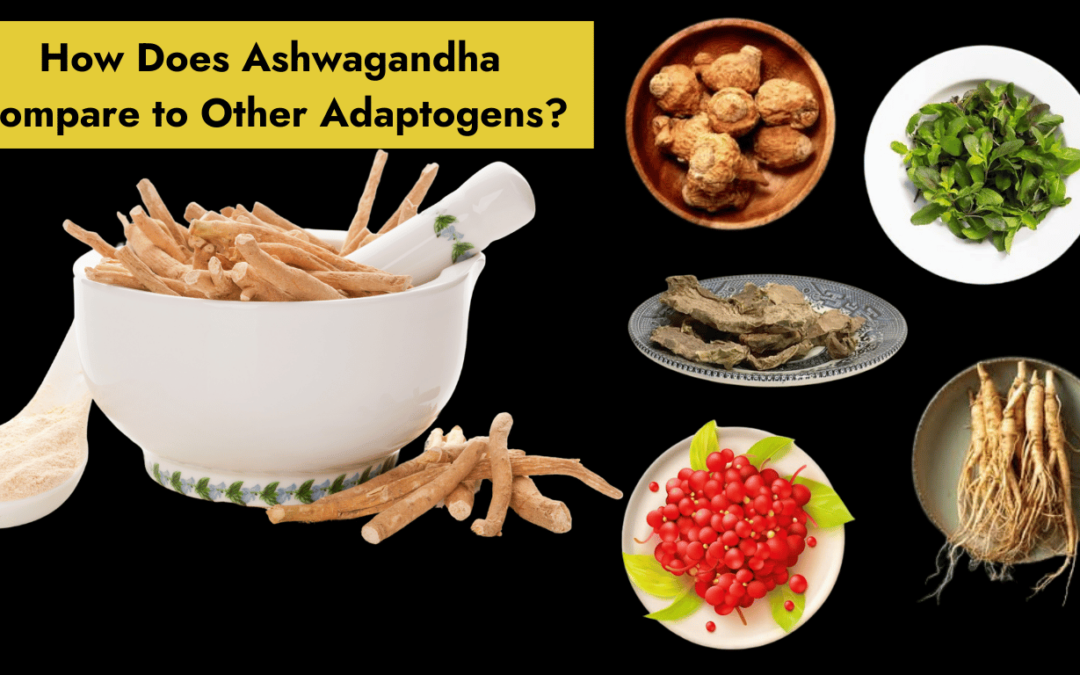In the world of natural health, adaptogens have gained immense popularity for their ability to help the body resist stress, restore balance, and promote overall well-being. Among the most notable adaptogens is Ashwagandha, a powerful herb used for thousands of years in traditional Ayurvedic medicine.
But how does Ashwagandha stack up against other popular adaptogens like Rhodiola, Holy Basil, and Ginseng?
Let’s explore the unique benefits and potential drawbacks of Ashwagandha compared to its fellow adaptogens.
What Are Adaptogens?
Adaptogens are natural substances, typically derived from plants, herbs, or mushrooms, that help the body adapt to and manage stress more effectively.
The term “adaptogen” was first introduced in the 1940s by Russian scientist Nikolai Lazarev, who described these substances as non-toxic plants that increase resistance to stressors of all kinds, whether physical, chemical, or biological.
Since then, adaptogens have been a significant focus of research, especially in traditional and holistic medicine.
How Do Adaptogens Work?
Adaptogens work at a cellular level to stabilize and balance the body’s physiological processes. They help regulate the adrenal glands, which produce hormones like cortisol and adrenaline in response to stress.
By modulating the stress response, adaptogens prevent overactivity or underactivity of stress-related systems, helping the body maintain homeostasis (balance).
Here’s a simplified breakdown of how adaptogens influence the body:
- Modulate the HPA Axis: The hypothalamic-pituitary-adrenal (HPA) axis is the central stress response system. Adaptogens interact with this axis to manage the release of stress hormones like cortisol, ensuring they are produced in the right amounts for the body’s needs.
- Support Neurotransmitter Balance: Many adaptogens influence neurotransmitters such as serotonin, dopamine, and GABA, which are critical for mood regulation and overall mental well-being.
- Protect Against Oxidative Stress: Adaptogens have antioxidant properties that combat free radicals, reducing cellular damage and promoting longevity.
- Enhance Energy and Stamina: By supporting the function of the mitochondria (the energy powerhouses of cells), adaptogens can improve energy production, physical performance, and recovery.
Who Can Benefit from Adaptogens?
Adaptogens can be beneficial for a wide range of people, especially those:
- Experiencing chronic stress or anxiety
- Feeling mentally or physically fatigued
- Looking to boost athletic performance or recovery
- Dealing with hormonal imbalances
- Wanting to improve cognitive function and focus
However, while adaptogens are generally safe, it’s crucial to use them wisely. Pregnant or breastfeeding individuals, people with autoimmune conditions, or those on certain medications should consult a healthcare provider before incorporating adaptogens into their routine.
Ashwagandha: The “King of Adaptogens”

Scientific Name: Withania somnifera
Primary Benefits: Stress reduction, improved sleep, cognitive enhancement, hormone balance, and immune support.
Key Active Compounds
Withanolides: These steroidal lactones are known for their anti-inflammatory and antioxidant properties.
Alkaloids: They help with stress relief and pain management.
Saponins: Contribute to Ashwagandha’s immune-boosting effects.
How Ashwagandha Works:
Ashwagandha is well-regarded for its ability to reduce cortisol levels, the hormone associated with stress. It also has a calming effect on the nervous system, promoting relaxation and sleep. Additionally, Ashwagandha may enhance physical performance, improve testosterone levels, and support thyroid health.
You can also read: How Ashwagandha Works:A Deep Dive into its Mechanisms
Comparing Ashwagandha to Other Adaptogens
Rhodiola Rosea

Scientific Name: Rhodiola rosea
Primary Benefits: Improved energy, enhanced mental focus, and reduced fatigue.
- Similarities to Ashwagandha: Both herbs combat stress and support mental well-being. They are used to promote calm and reduce anxiety.
- Differences: Rhodiola is particularly known for its energy-boosting effects. It is often used to combat fatigue and improve physical endurance. Unlike Ashwagandha, which has more of a calming effect, Rhodiola is a great option for those who need a natural pick-me-up.
- Best For: Individuals experiencing burnout, fatigue, or needing enhanced cognitive function without sedation.
Holy Basil (Tulsi)

Scientific Name: Ocimum sanctum
Primary Benefits: Anti-inflammatory, immune-boosting, and anxiety-reducing.
- Similarities to Ashwagandha: Both herbs help reduce anxiety and improve the body’s stress response. They also support immune health.
- Differences: Holy Basil has significant anti-inflammatory and antibacterial properties, making it an excellent choice for respiratory health and immune support. Ashwagandha, on the other hand, is more focused on balancing hormones and reducing physical stress.
- Best For: People seeking immune system support or relief from inflammation and respiratory conditions.
Ginseng (Panax Ginseng & American Ginseng)

Scientific Name: Panax ginseng (Asian) & Panax quinquefolius (American)
Primary Benefits: Enhanced energy, cognitive performance, and immune function.
- Similarities to Ashwagandha: Both are used to boost energy and reduce stress. They also support the immune system and physical stamina.
- Differences: Panax Ginseng is a more stimulating adaptogen, often used for boosting physical energy and mental sharpness. It’s great for athletes or those needing an energy boost, but it may be too stimulating for individuals prone to anxiety. Ashwagandha, conversely, is more suitable for calming the mind and improving sleep.
- Best For: Those who need an energy boost or improved physical endurance.
Schisandra Berry

Scientific Name: Schisandra chinensis
Primary Benefits: Improved liver function, enhanced focus, and stress reduction.
- Similarities to Ashwagandha: Both are used to manage stress and improve mental clarity. Schisandra is also known to stabilize mood and improve energy.
- Differences: Schisandra has a unique reputation for liver protection and detoxification. It also enhances focus and concentration without causing overstimulation, making it ideal for people needing a sustained energy lift throughout the day.
- Best For: People who want to support liver health, improve mental clarity, or boost stamina.
Maca Root

Scientific Name: Lepidium meyenii
Primary Benefits: Hormone balance, improved libido, and increased energy.
- Similarities to Ashwagandha: Both herbs can support hormonal health and boost libido. They are also beneficial for physical endurance.
- Differences: Maca root is particularly effective at balancing hormones and is commonly used for reproductive health. It enhances energy levels but does not have the same calming effects as Ashwagandha.
- Best For: Individuals focusing on hormone balance, fertility, or libido enhancement.
Which Adaptogen Is Right for You?
Choosing the right adaptogen depends on your specific health goals:
- For Reducing Stress and Anxiety: Ashwagandha and Holy Basil are excellent choices for calming the mind and reducing stress.
- For Boosting Energy and Focus: Rhodiola and Ginseng provide a stimulating effect that helps with energy and mental clarity.
- For Hormonal Support: Ashwagandha and Maca are ideal for balancing hormones and supporting reproductive health.
- For Liver Health and Detoxification: Schisandra offers unique benefits for liver function and detoxification.
Potential Side Effects and Considerations
While adaptogens are generally safe for most people, it’s important to consult with a healthcare provider, especially if you are pregnant, breastfeeding, or taking medication. Ashwagandha, for example, may not be suitable for individuals with thyroid disorders or autoimmune conditions without medical supervision.
Final Thoughts
Ashwagandha stands out among adaptogens for its well-rounded benefits, particularly in reducing stress, improving sleep quality, and supporting hormonal balance. However, other adaptogens like Rhodiola, Ginseng, and Holy Basil offer unique advantages that might better suit specific needs. By understanding the differences, you can make an informed decision about which adaptogen is right for your wellness journey.
Would you like to learn more about any specific adaptogen or their scientific studies in greater detail?

